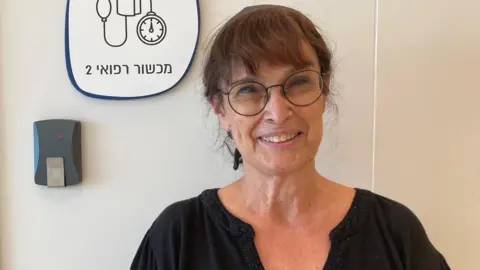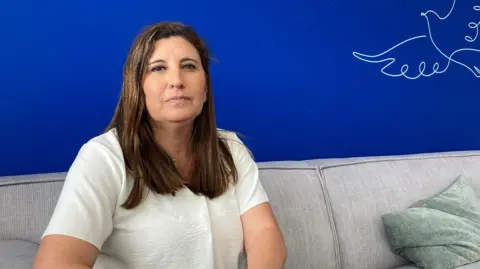 BBC
BBCWhen the first hostages in Gaza are released by Hamas, flown to Israel and taken by helicopter to the Rabin Medical Center in Petah Tikva, Dr. Michal Steinman will take them to the sixth floor, open the glass door and watch them reunite with their closest families after more than 700 days in captivity.
“It’s a privilege,” says the head nurse. “These are the moments, when I’m 70 or 80 years old, these are the two or three moments that I will remember. They symbolize many values - as a nurse, as a mother, as a woman, as an Israeli.”
Twenty hostages are scheduled to be released alive under the terms of the agreement between Israel and Hamas. Many of them will be brought to this hospital.
This will be the third time the hostage unit has operated. The BBC visited the unit on Saturday, when the medical team learned the identity of the hostages they would be treating.
Dr Steinman told the BBC: “There is no field called family medicine, and we are inventing it.”
It says staff have learned two big lessons from the two previous hostage releases in November 2023 and January of this year.
The first is to be a “medical investigator”, to try to understand what happened in those long days and nights of captivity.
With the former hostages, who were often emaciated, bound and beaten, “they had things in their blood tests, in their enzymes, that we couldn’t understand.”
They have also learned that symptoms may not appear for several days or weeks.
“Captivity does things to your body that your body remembers. You see all these layers. It takes time to see what happened to their bodies and their souls,” she said.
“We are still taking care of the hostages who returned in January and February, and every week we discover new things.”
 Reuters
ReutersThe other lesson is to take some time. There are a large number of professionals from different specialties: nutritionists, social workers, mental health specialists, as well as a whole staff of medical staff.
But there is also a “Do Not Disturb” card on the door of the private room for each released hostage. The echoes of the hotel are intentional, as are the care packages, soft furnishings, soft lighting that matches a hospital bed, and monitoring equipment. There is an extra single bed for those hostages who do not want to be left alone overnight, so that their partner or relative can sleep next to them. The closest family members will also have their own bedroom directly across the corridor from the hostage room.
“You know that medical professionals are task-oriented. There’s a schedule,” says Dr. Steinman. “Here you have to give them much more space. You have to decide what is urgent, and what can wait another two days. You have to be humble and flexible, without abandoning your medical responsibility.”
Among these responsibilities is determining what the hostages, some of whom may have lost more than half their body weight in captivity, can eat and how quickly.
Their physical recovery is only part of the story. Karina Schwarz is the director of social work at Rabin Medical Center. She is another key member of the team, and has a responsibility not only to the hostages, but also to their next of kin. She says they need to learn to carefully calibrate family dynamics — when to talk and when not to talk.
“The most important thing is what we don’t say,” she says. “Because if we’re sitting in a room, and someone tells us something very difficult about how they almost died in captivity, and we stay silent: it’s a very loud silence.”
But at the same time, there is a need to step back. “We can’t talk about two years a week. Hostages need space and time. They also need calm. We have to listen. To hear their story.”

The workers in the hostage return unit confirm that their work does not end when the hostages return to their homes. Ms. Schwartz says medical and psychological rehabilitation will continue, and the hostages must also be prepared for the moment “when the real world comes calling.”
The message she and her team are trying to get across to the hostages and their families is that everyone will want to see them. For two years they were public figures.
“Everyone wants to be friends. We tell them: It’s okay to say no. It’s safe to say no.”
By now, nervous anticipation is palpable among employees.
“You should see my WhatsApp messages,” says Dr. Steinman, an Israeli nurse manager with a piercing in her nose and multiple tattoos.
She says nearly every one of her 1,700 nurses at the medical complex has volunteered to pull extra shifts on the unit.
“You gain hope again,” she says. “Working here you realize that life and people are good. You realize the power of the human spirit.”
However, the greatest joy, she says, is when the work is finished.
“This is the third time we’ve opened the unit. Let’s know this is the last time: when we close this place and say the job is over. Then we’ll know the nightmare is over.”
https://ichef.bbci.co.uk/news/1024/branded_news/167b/live/252b1e00-a6cb-11f0-bf22-9df87c17cee5.jpg
Source link
